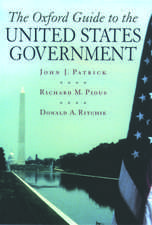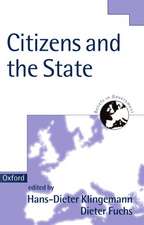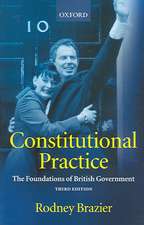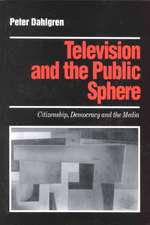Freedom of Speech: Importing European and US Constitutional Models in Transitional Democracies: Routledge Research in Constitutional Law
Autor Uladzislau Belavusauen Limba Engleză Paperback – 18 iul 2015
The book first explores freedom of expression in European and American law looking particularly at hate speech, historical revisionism, and pornography. It subsequently enquires into the role and perspectives of those European (mandatory) and US-American (persuasive) models for the constitutional debate in Central and Eastern Europe. The study offers an original interpretation of the "European" model of freedom of expression, beyond the mechanisms of the Council of Europe. It encompasses the relevant aspects of EU law (judgments of the Court of Justice and the harmonised EU instruments) as mandatory standards for courts and legislators, including those in transitional countries of Central and Eastern Europe. The book argues for de-criminalisation of historical revisionism and pornography, and illuminates topics such as genocide denial, the rise of Prague and Budapest as Europe’s porno-capitals, anti-Semitism and anti-Gypsyism, religious obscurantism and homophobia, virulent Islamophobia, and the glorification of terrorism.
The research methodology in this study combines a descriptive case law assessment (comparative constitutional, public international, and EU law) with a normative critique stemming from post-structuralist scrutiny, rhetoric, postmodern legal movements, legal history, history of ideas, and art criticism.
This book will be of interest to students and scholars of, comparative constitutional law, law and society, human rights and European law as well as political philosophers.
| Toate formatele și edițiile | Preț | Express |
|---|---|---|
| Paperback (1) | 447.51 lei 43-57 zile | |
| Taylor & Francis – 18 iul 2015 | 447.51 lei 43-57 zile | |
| Hardback (1) | 1064.01 lei 43-57 zile | |
| Taylor & Francis – 9 sep 2013 | 1064.01 lei 43-57 zile |
Din seria Routledge Research in Constitutional Law
-
 Preț: 311.28 lei
Preț: 311.28 lei -
 Preț: 302.65 lei
Preț: 302.65 lei -
 Preț: 459.05 lei
Preț: 459.05 lei -
 Preț: 318.24 lei
Preț: 318.24 lei - 8%
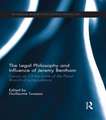 Preț: 385.12 lei
Preț: 385.12 lei - 16%
 Preț: 264.18 lei
Preț: 264.18 lei -
 Preț: 389.66 lei
Preț: 389.66 lei - 18%
 Preț: 1000.27 lei
Preț: 1000.27 lei - 18%
 Preț: 1010.35 lei
Preț: 1010.35 lei - 12%
 Preț: 325.34 lei
Preț: 325.34 lei - 17%
 Preț: 272.23 lei
Preț: 272.23 lei -
 Preț: 369.61 lei
Preț: 369.61 lei - 18%
 Preț: 1005.39 lei
Preț: 1005.39 lei -
 Preț: 410.46 lei
Preț: 410.46 lei -
 Preț: 385.25 lei
Preț: 385.25 lei -
 Preț: 389.88 lei
Preț: 389.88 lei - 16%
 Preț: 262.83 lei
Preț: 262.83 lei -
 Preț: 489.26 lei
Preț: 489.26 lei -
 Preț: 389.66 lei
Preț: 389.66 lei - 17%
 Preț: 259.98 lei
Preț: 259.98 lei - 17%
 Preț: 259.98 lei
Preț: 259.98 lei - 19%
 Preț: 259.98 lei
Preț: 259.98 lei -
 Preț: 388.90 lei
Preț: 388.90 lei -
 Preț: 489.26 lei
Preț: 489.26 lei - 18%
 Preț: 1056.00 lei
Preț: 1056.00 lei -
 Preț: 389.66 lei
Preț: 389.66 lei
Preț: 447.51 lei
Nou
Puncte Express: 671
Preț estimativ în valută:
85.63€ • 89.63$ • 71.27£
85.63€ • 89.63$ • 71.27£
Carte tipărită la comandă
Livrare economică 31 martie-14 aprilie
Preluare comenzi: 021 569.72.76
Specificații
ISBN-13: 9781138935129
ISBN-10: 1138935123
Pagini: 304
Dimensiuni: 156 x 234 x 15 mm
Greutate: 0.41 kg
Ediția:1
Editura: Taylor & Francis
Colecția Routledge
Seria Routledge Research in Constitutional Law
Locul publicării:Oxford, United Kingdom
ISBN-10: 1138935123
Pagini: 304
Dimensiuni: 156 x 234 x 15 mm
Greutate: 0.41 kg
Ediția:1
Editura: Taylor & Francis
Colecția Routledge
Seria Routledge Research in Constitutional Law
Locul publicării:Oxford, United Kingdom
Public țintă
PostgraduateCuprins
1. Introduction 2. Transitional Democracies in Central and Eastern Europe 3. Hate Speech: "US-American" and "European" Models 4. Hate Speech In Transitional Democracies: The Czech Republic, Hungary, And Poland 5. Historical Revisionism 6. Pornography 7. Conclusions
Recenzii
"Belavusau has presented a very important and interesting book, written by an impressively erudite scholar in very vivid, sometimes almost poetic, language. […] Belavusau has established many important arguments and the book undoubtedly brings an added value to the comparative legal research on freedom of speech in its particular aspects. It is innovative and thought provoking. […] Belavusau’s book is a well-argued position in this discussion, which from now on will constitute mandatory reading for its participants."
Review in the Polish Yearbook of International Law volume XXXIII 2013 by Aleksandra Gliszczyńska-Grabias, Institute of Law Studies of the Polish Academy of Sciences
Review in the Polish Yearbook of International Law volume XXXIII 2013 by Aleksandra Gliszczyńska-Grabias, Institute of Law Studies of the Polish Academy of Sciences
Descriere
This book considers the issue of free speech in transitional democracies focusing on the socio-legal developments in the Czech Republic, Hungary, and Poland. In showing how these Central and Eastern European countries have engaged with free speech models imported from the Council of Europe / EU and the USA, the book offers valuable insights into the ways states have responded to challenges associated with transformation from communism to Western democracy. This book will be of interest to students and scholars of, comparative constitutional law, law and society, human rights and European law as well as political philosophers.

